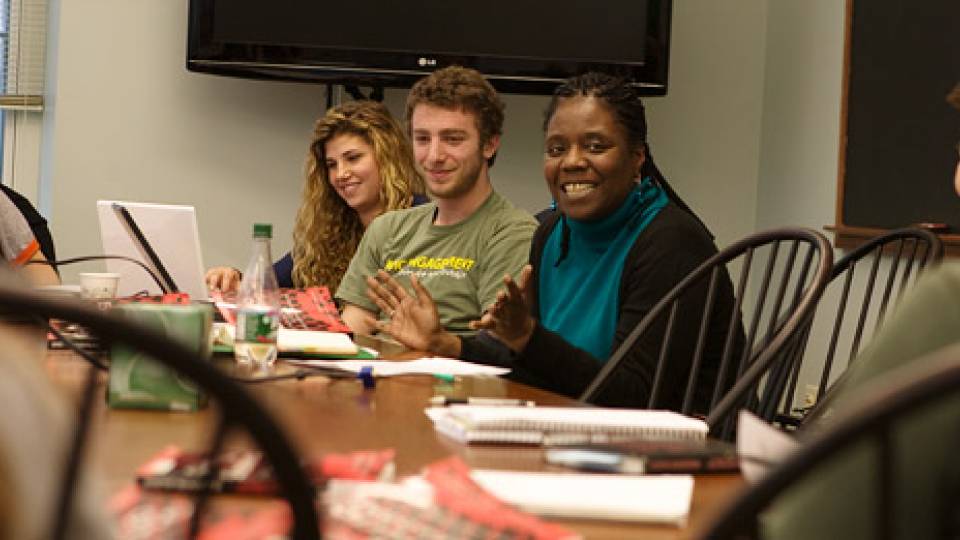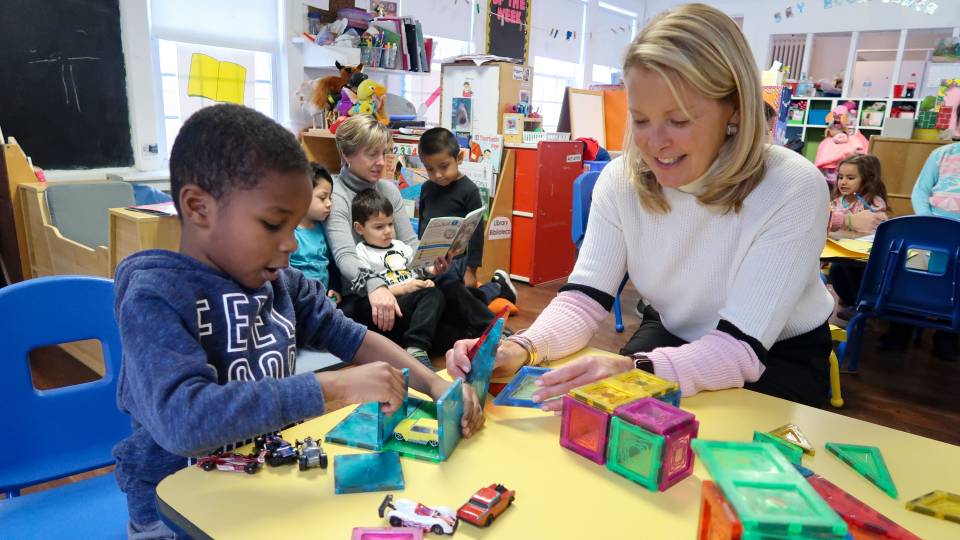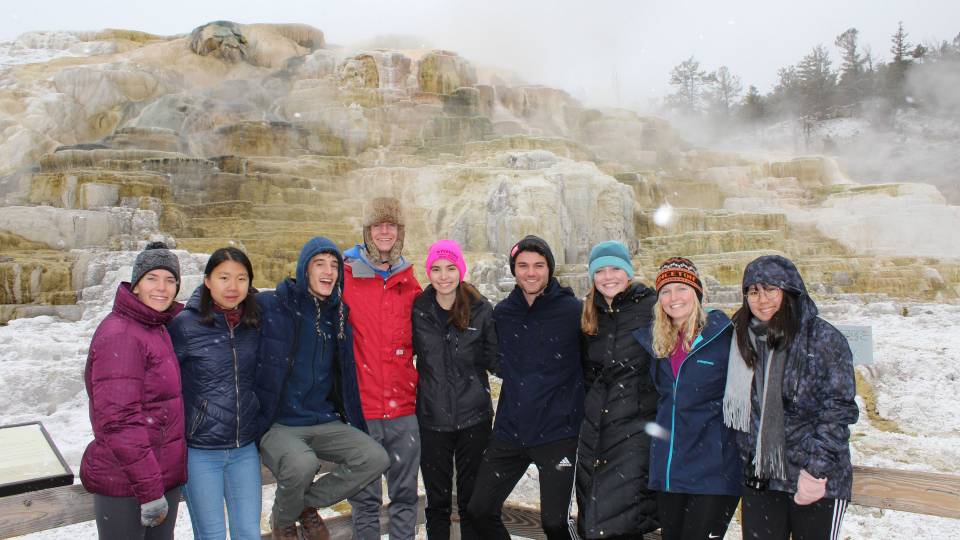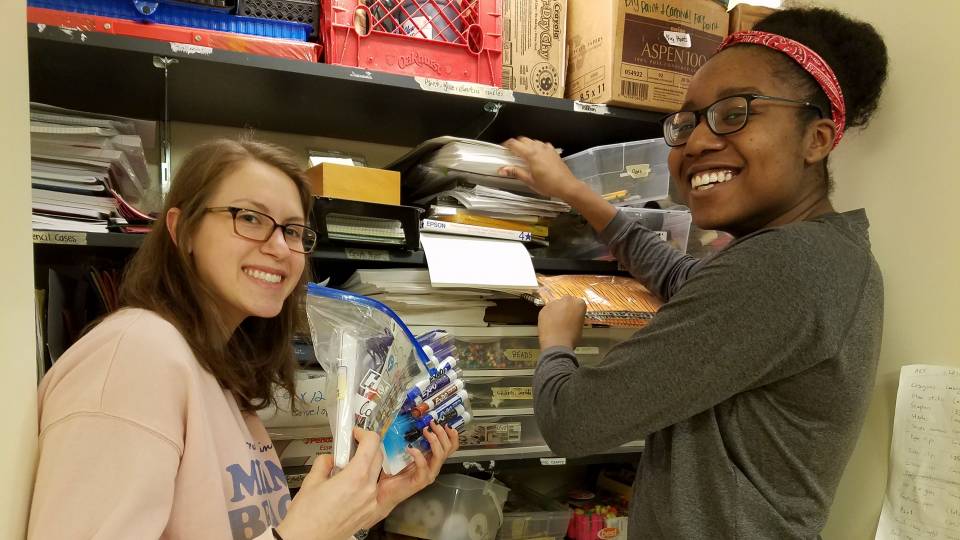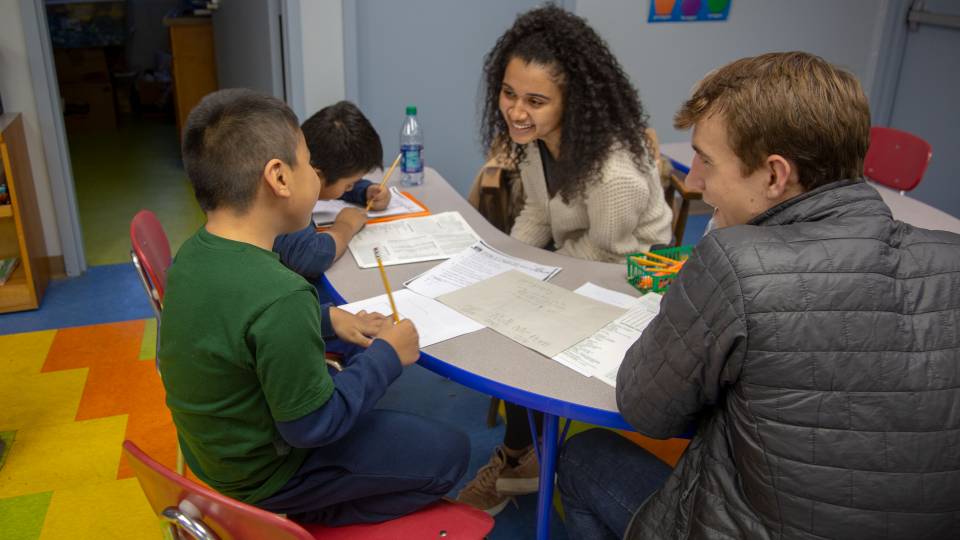In the halls of Martin Luther King Jr. School in Trenton, N.J., sixth-graders frequently stop guidance counselor Marsha Martin in the hallway to ask, "Is Princeton Project coming today?"
The sixth-graders are hoping it's Monday or Friday, the days when a group of undergraduate students from Princeton University come to help them with grammar and study skills. The tutoring is part of a unique collaboration among a group of Princeton students and professors and an affiliated center that works with underserved youth, designed to help elementary school students in Trenton grow academically and socially.
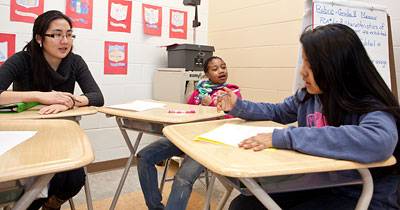
Sophomore Kristie Liao (left) loves "having the opportunity to interact with the kids," she said. "And it's nice to be able to give back to your community." She talks about study skills with two sixth-graders in their classroom at Martin Luther King Jr. School in Trenton.
Since October, the Trenton sixth-graders have received tutoring twice a week through the Student Volunteers Council, a student-led organization that is part of Princeton's Pace Center for Civic Engagement. As part of the same project, other pupils from the school are participating in a program with the Princeton-Blairstown Center to enhance their social and emotional learning skills. The Blairstown Center is affiliated with the University and operates adventure-based and experiential education programs for urban youth and their families.
The outcomes of both endeavors are being studied by Angel Harris, an assistant professor of sociology and African American studies at Princeton, to draw conclusions about their overall effectiveness. The project seeks to determine, in part, if curriculum-based tutoring and mentoring on learning skills influences students differently than more common homework-based tutoring programs.
"We're bringing together the power of this campus in several areas to work with Trenton youth," said David Brown, who serves as staff director of the Student Volunteers Council.
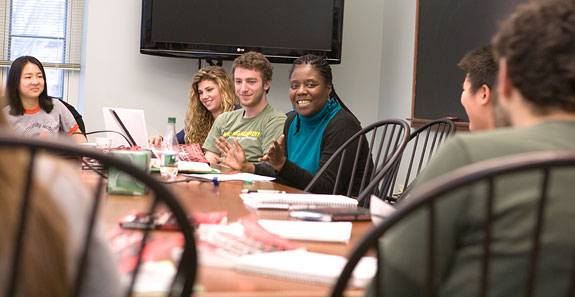
The collaboration grew out of the freshman seminar "Our Struggling Schools: Race, Culture and Urban Education," which was taught last spring by Noliwe Rooks (above center), associate director of the University's Center for African American Studies. The students in the seminar conducted research on the effectiveness of different types of tutoring programs and wanted to put their findings to work.
Urban education seminar spurs project
The effort grew out of the freshman seminar "Our Struggling Schools: Race, Culture and Urban Education," which was taught last spring by Noliwe Rooks, associate director of the University's Center for African American Studies. While learning about the problems confronting urban schools and school reform movements, the students in the seminar conducted research on the effectiveness of different types of tutoring programs and presented their results to Trenton's school superintendent.
But Rooks and her students wanted to do more than research -- they wanted to put their findings to work. To make that happen, Rooks brought together the Pace Center, the Blairstown Center and Harris, who studies the achievement gap across racial and ethnic groups in primary and secondary education.
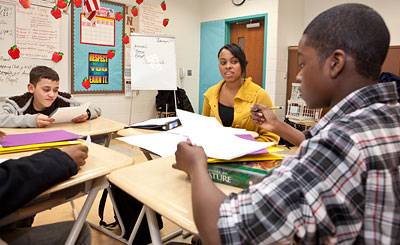
On a recent tutoring day at Martin Luther King Jr. School in Trenton, N.J., junior Alexandria ("Cammie") Brown (center) worked with two sixth-graders on keeping their study materials organized. The tutors gathered the pupils in groups of three or four to talk about grammar, vocabulary and study skills.
"We're making it possible for Princeton students to be on the front lines of addressing educational inequality in the public schools," Rooks said. The project is part of a civic initiative by the Center for African American Studies that works with students to research, propose and implement solutions to pressing social issues.
The research conducted by Rooks' class found that tutoring based on a pupil's school curriculum had been shown to be more effective than after-school homework help. So Pace Center volunteers Alexander Craig and Alexandra Gecker, both juniors, organized a new tutoring program using a curriculum that is tied to what the pupils are already learning in school. They called the initiative Princeton Academic Curriculum Tutoring, though the Trenton pupils refer to it more simply as "Princeton Project." More than 100 Princeton students have expressed an interest in participating in the program, which has slots for 25 tutors and organizers.
Pupils learn 'new stuff' and get organized
"We wanted to train our volunteers, have them work with the same students every week and teach them a curriculum," Gecker said. The Princeton students give the pupils weekly quizzes to make sure the lessons are sticking.
Seven Princeton students arrive in teacher Sharon Zeppadoro's classroom at 2:30 p.m. every Monday and Friday. They gather their 26 pupils in groups of three or four to talk about grammar, vocabulary and study skills. For the next 45 minutes, the Princeton students are in charge.
At a recent tutoring session, junior Alexandria ("Cammie") Brown talked to Corey, 12, and Gabriel, 13, about keeping their study materials organized, a topic that had been introduced the previous week.
"Do you remember why we organize our folders?" she asked.
"To keep our stuff together," Corey replied.
Brown asked the pupils to put their papers in the right-side pocket of their folders, and warned there would be "folder checks" in the future.
"I'll never lose my notes again," Gabriel said.
Gabriel said he enjoys the Princeton tutors because "we get to learn new stuff we never learned before. I look forward to it every week."
Nydashia, who is 11, said the sessions have "helped with tests and when I do my homework."
"The kids are loving this," said Zeppadoro, who has been a teacher for 30 years. She finds the tutoring is "very helpful for me because they need reinforcement in their basic grammar skills. It's such a big help for their essays."
The Princeton students are equally enthusiastic.
"I love having the opportunity to interact with the kids," said sophomore Kristie Liao. "And it's nice to be able to give back to your community." The pupils are curious about college life, Liao said, and she talks to them about their plans after high school. "We're helping them think about the future. Just having these conversations with them is a good starting point."
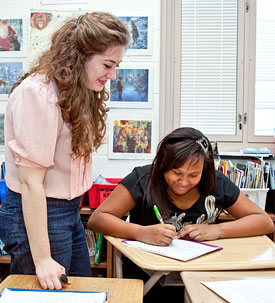
The tutoring program runs until June, when the pupils' test scores, grades and answers to a survey will be analyzed to quantify the benefits of the tutoring. At left, sophomore Elizabeth Scullin works with a sixth-grader in Trenton.
There also is a pen pal program, in which the pupils write short pieces in their notebooks and give them to the tutors, who hand them off to Princeton correspondents on campus -- many of whom wanted to be tutors but couldn't be accommodated. The Princeton students write back messages, which the tutors bring to the next session. The exchanges will continue throughout the semester to help the Trenton pupils practice the grammar and vocabulary they are learning.
"We hope the pen pal program allows the Trenton students an emotional outlet if they need one, and that they are encouraged by having their pen pals communicate with them regularly on a personal level," Craig said.
In the Blairstown branch of the program, a group of sixth-, seventh- and eighth-graders gathers in the school's library on Fridays to do activities with Blairstown facilitators that help improve the pupils' self-esteem, decision-making and relationship skills. The pupils work together to plan and accomplish a goal, such as undoing a knot with everyone's hands holding a rope, or getting the whole group to fit on a four-foot square of wood. Then they discuss how they worked together to solve challenges, and how those same skills apply to academics and life.
Andrew Shurtleff, one of four Blairstown facilitators, said, "Encouraging students to think critically, ask questions and approach problems creatively is at the core of our work. This not only serves the individual's sense of confidence and self-worth, it also demonstrates the value of diverse perspectives and approaches to problem-solving. As facilitators, we strive to create the conditions necessary for students to succeed where they may not have before."
Quantifying the program's outcomes
When the program wraps up at the end of the pupils' school year, Harris will begin studying the results.
"We want to get a sense of how the kids change over time," Harris said. "We expect the change to be greater for children who received interventions."
The pupils participating were split into four groups: those receiving tutoring from Princeton students; those participating in the Blairstown program; those participating in both the tutoring and the Blairstown program; and a fourth group who are not receiving any intervention and serve as a control group.
Before the programs began last October, all of the approximately 200 participating pupils completed a 300-question survey that asked about their study habits, achievements and feelings about school. In June, they will retake the survey. By analyzing those survey results, as well as test scores and grades, Harris will be able to quantify the expected gain in achievement that can be attributed to the program.
Harris is excited about the project "because it has the potential to identify something that works," he said.
Brown from the Pace Center is thrilled that Harris is studying the program's results.
"We love the idea that there are built-in outcome measurements in this program," Brown said. "The goal is to find something that's effective and that can hopefully be replicated by student volunteers in other schools."
The program also is influencing its Princeton participants. For Gecker, who helps run the tutoring initiative, working with the Trenton pupils led her to change her academic plans. An economics major, she is focusing her junior independent work on New Jersey's historically struggling school districts and thinking about pursuing a master's degree in urban education policy.
"When I started tutoring, I had no idea that my passion for urban education would grow this much," Gecker said. "I'm very pleased with how much we've been able to accomplish, but I'm also so humbled by how much there is left to do."
For sophomore Derek Wu, who was in Rooks' class and now is a co-coordinator of the tutoring program, the impact also has been profound.
"It's one thing to think up policy ideas or proposals, and it's another to actually see them in action," he said. "Learning about the achievement gap in urban districts such as Trenton is exceedingly important, but it's hard to grasp its reality until one escapes the borders of the classroom to become actively involved at the fieldwork level."
Now that he is interacting with sixth-graders every week, Wu said, he can "examine the implementation of education policy in classrooms firsthand and, perhaps most importantly, realize that there is a kid behind every single statistic that policymakers discuss."


